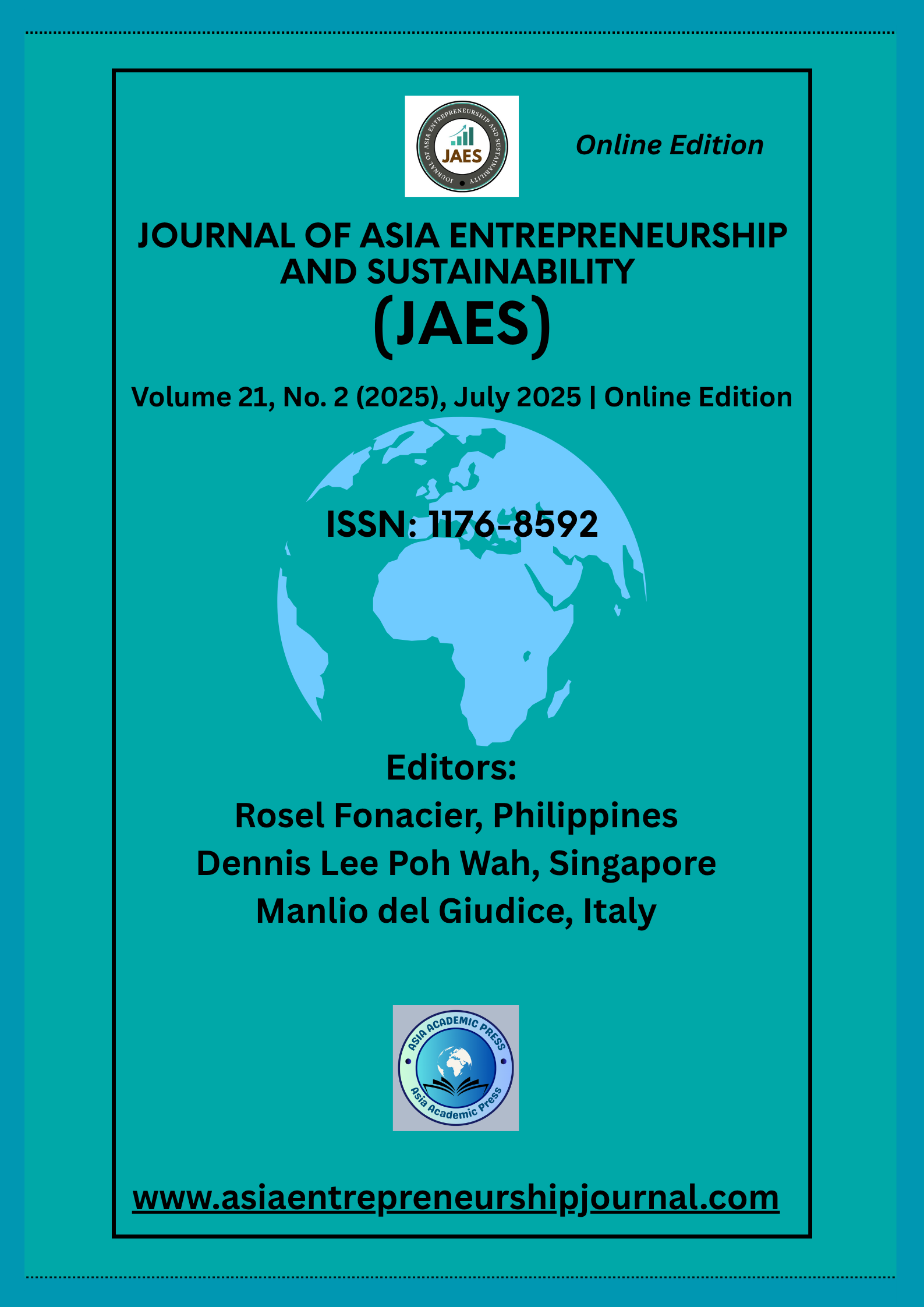Corporate Social Responsibility as a Strategic Tool for Sustainable Growth: A Comparative Study of Startups in India and Southeast Asia
DOI:
https://doi.org/10.53555/jaes.v21i2.35Keywords:
Startups, corporate social responsibility, sustainable growth, emerging economies, Southeast AsiaAbstract
Emerging market startups are increasingly turning to Corporate Social Responsibility (CSR) as a strategic means for sustainable growth. The increasing complexity of socio-economic contexts of India and Southeast Asia requires a greater understanding of CSR models are embedded into entrepreneurial ecosystems. The practices have moved from a compliance-based to an innovation-driven model that adds value to enterprises over the long term. This study used a mixed-methods design integrating structured surveys, semi-structured interviews, and secondary data analysis in 60 startups, 30 from India and 30 from Southeast Asia. The results were higher integration in Indian startups by virtue of regulatory requirements, and Southeast Asian startups exhibited varied CSR patterns shaped by socio-cultural and institutional contexts. Tellingly, some of the key metrics like employee retention, trust scores, and revenue growth were correlated positively with robust CSR alignment. Industry-wise, clean energy and healthcare turned out to be CSR leaders. CSR becomes a key driver of both social influence and business robustness.
References
1. Androniceanu, A. (2019). Social responsibility, an essential strategic option for sustainable development in the field of bio-economy. Amfiteatru Economic, 21(52), 503-519.
2. Bakhshi, P., Agrawal, R., Mendon, S., Birau, R., & Bărbăcioru, I. C. (2023). Framework of SDG leadership among SMEs in South Asian nations-using Interpretive Structural Modelling. Cogent Business & Management, 10(3), 2253607.
3. Bańka, M., Salwin, M., Tylżanowski, R., Miciuła, I., Sychowicz, M., Chmiel, N., & Kopytowski, A. (2023). Start-up accelerators and their impact on entrepreneurship and social responsibility of the manager. Sustainability, 15(11), 8892.
4. Baskaran, A., Chandran, V. G. R., & Ng, B. K. (2019). Inclusive entrepreneurship, innovation and sustainable growth: Role of business incubators, academia and social enterprises in Asia. Science, Technology and Society, 24(3), 385-400.
5. Belas, J., Dvorsky, J., Hlawiczka, R., Smrcka, L., & Khan, K. A. (2024). SMEs' sustainability: The role of human resource management, corporate social responsibility and financial management. Oeconomia Copernicana, 15(1), 307-342.
6. Bhatnagar, M., Taneja, S., & Özen, E. (2022). A wave of green start-ups in India—The study of green finance as a support system for sustainable entrepreneurship. Green Finance, 4(2), 253.
7. Bikefe, G., Zubairu, U., Araga, S., Maitala, F., Ediuku, E., & Anyebe, D. (2020). Corporate Social Responsibility (CSR) by small and medium enterprises (SMEs): a systematic review. Small Business International Review (SBIR), 4(1), 16-33.
8. Hidayat, Z. (2021, March). Sustainable development through sharing economy: Contribution of online transportation to urban everyday life. In 2nd Southeast Asian Academic Forum on Sustainable Development (SEA-AFSID 2018) (pp. 277-284). Atlantis Press.
9. Le, T. H., Park, D., & Castillejos-Petalcorin, C. (2023). Performance comparison of state-owned enterprises versus private firms in selected emerging Asian countries. Journal of Asian Business and Economic Studies, 30(1), 26-48.
10. Ling, Y. H. (2019). Cultural and contextual influences on corporate social responsibility: a comparative study in three Asian countries. Cross Cultural & Strategic Management, 26(2), 290-310.
11. Malpani, R., Baral, M. M., Panigrahi, R. R., & Chittipaka, V. (2025). Unveiling the dynamic nexus between corporate social responsibility, innovations and financial performances in 21st-century Indian start-ups. International Journal of Organizational Analysis, 33(5), 1114-1131.
12. Morgan, C. (2017). Public private partnerships and corporate social responsibility: Needs for and impacts on education in India and Indonesia. Corporate Social Responsibility and the Three Sectors in Asia: How Conscious Engagement Can Benefit Civil Society, 199-224.
13. Muff, K., Delacoste, C., & Dyllick, T. (2022). Responsible Leadership Competencies in leaders around the world: Assessing stakeholder engagement, ethics and values, systems thinking and innovation competencies in leaders around the world. Corporate Social Responsibility and Environmental Management, 29(1), 273-292.
14. Nguyen, M. V. (2024). Corporate social responsibility performance and its effects on climate for innovation and opportunism: evidence from Vietnamese architectural design firms. Engineering, Construction and Architectural Management, 31(2), 812-834.
15. Pillai, T. R., & Ahamat, A. (2018). Social-cultural capital in youth entrepreneurship ecosystem: Southeast Asia. Journal of Enterprising Communities: People and Places in the Global Economy, 12(2), 232-255.
16. Satar, M. S., & John, S. (2016). A conceptual model of critical success factors for Indian social enterprises. World Journal of Entrepreneurship, Management and Sustainable Development, 12(2).
17. Saxena, N., & Afreen, S. (2017). Stakeholder initiatives for promoting corporate social responsibility: a four-country study. International Journal of Indian Culture and Business Management, 15(3), 299-325.
18. Sengupta, S., & Sahay, A. (2017). Comparing mission statements of social enterprises and corporate enterprises in the new and renewable energy sector of India: A computer aided content analysis study. Journal of Global Entrepreneurship Research, 7, 1-16.
19. Shariat, S., & Khamseh, Z. (2022). ‘Fruits of the same tree’? A systematic review of corporate social responsibility and social enterprise comparative literature. Corporate Responsibility, Sustainability and Markets: How Ethical Organisations and Consumers Shape Markets, 185-214.
20. Siota, J., & Prats, M. J. (2021). Open Innovation How Corporate Giants Can Better Collaborate with Deep-Tech Start-ups. The Case of East and Southeast Asia.
21. Sivathanu, B., & Pillai, R. (2020). An empirical study on entrepreneurial bricolage behavior for sustainable enterprise performance of startups: Evidence from an emerging economy. Journal of Entrepreneurship in Emerging Economies, 12(1), 34-57.
22. Swain, N. (2016). A Comparative Study on CSR Practices, CSR Implementation and Corporate Social Disclosure Practices between Selected Public and Private Sector Enterprises (in Baroda District) (Doctoral dissertation, Maharaja Sayajirao University of Baroda (India)).
23. Tang, Z., & Zhang, X. (2023). Public welfare crowdfunding decision-making of environmental nonprofit organizations based on social responsibility. Environmental Science and Pollution Research, 30(44), 99992-100005.
24. Thorisdottir, T. S., & Johannsdottir, L. (2020). Corporate social responsibility influencing sustainability within the fashion industry. A systematic review. Sustainability, 12(21), 9167.
25. Vig, S. (2023). Sustainable development through sustainable entrepreneurship and innovation: a single-case approach. Social Responsibility Journal, 19(7), 1196-1217.









